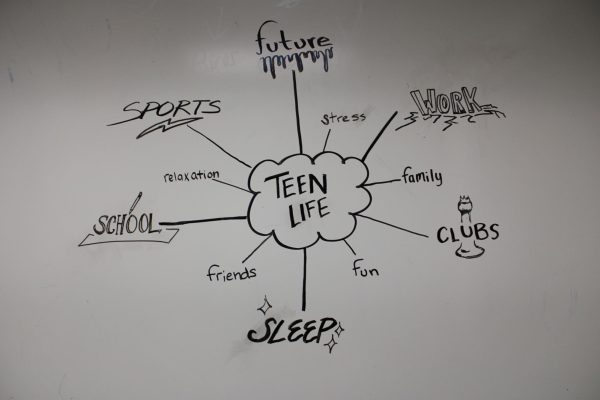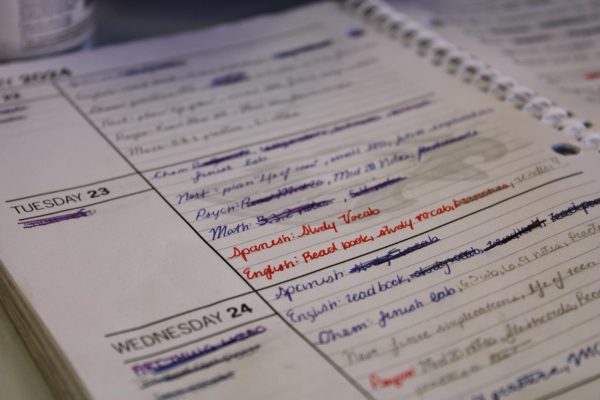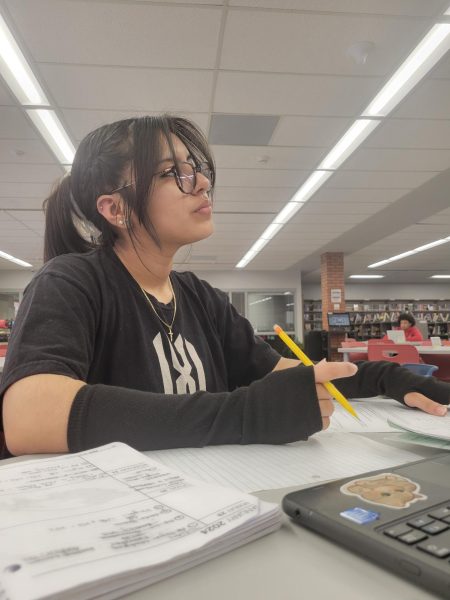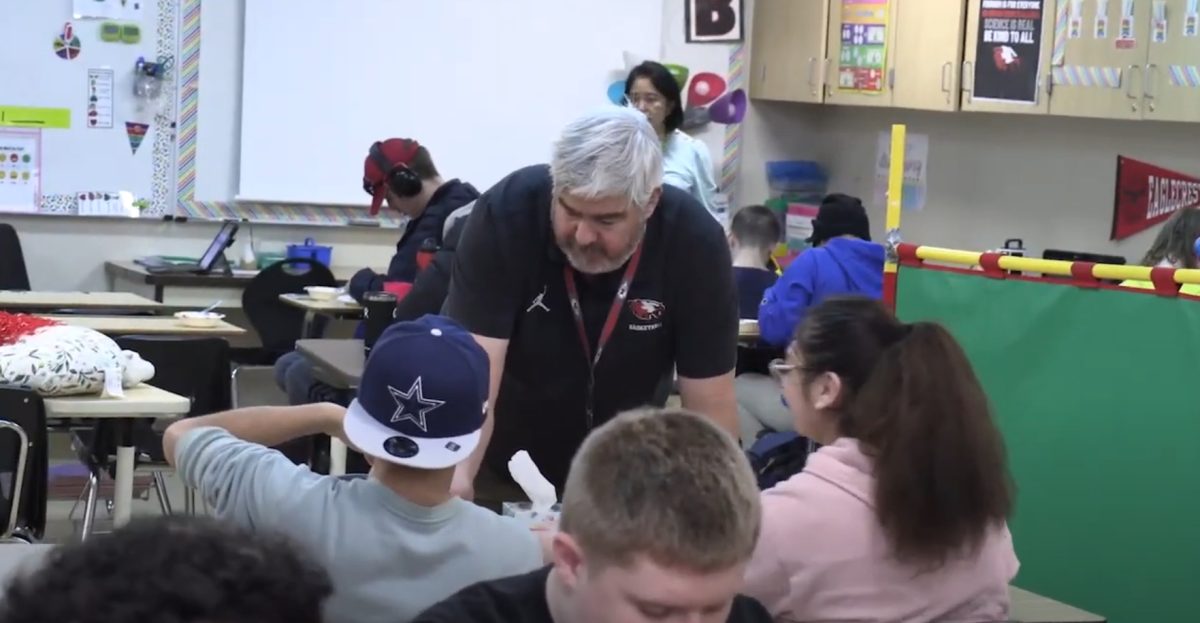Wake up. Eat. School. Work. Sleep. It’s the daily routine of many busy teenagers. The teens are undoubtedly a time of stress, an awkward phase where you’re not exactly a child, but also not exactly an adult. It’s a time of exploring new interests, planning for the future, and learning how to become a more stable, and independent person- all while still in high school.

(Avery Stelzriede)
Finding balance in this busy life is a challenge within itself, and school doesn’t make this task any easier. As of the 2024-25 school year, Eaglecrest will offer over 200 course options, and many students choose to challenge themselves with Advanced Placement, and Honors courses. These classes tend to have a more rigorous curriculum, deeper comprehension of materials, and more work that is expected to be completed outside of the classroom.
“It’s just a lot of content and a lot of memorization.” said Audrey Rosen, a junior currently enrolled in AP Calculus BC, “There’s a lot of formulas and so there’s a lot of studying I have to do.”
Along with this demanding math class, Rosen is taking three other AP classes, each of which requires time and dedication for her to complete and understand the material.
This constant dedication can take a toll on the mental, and physical health of teenagers, which is why it is crucial to take time out of the day to rest, relax, and socialize.

(Avery Stelzriede)
“I try to give myself a little break after school,” admits Rosen, “Even if I do have a lot of homework, I still try and have fun. Losing a few points on a late assignment isn’t worth having a breakdown in your bed.”
This motto is very beneficial to the many young minds who challenge themselves to take hard classes, but many more of the stresses of life come from outside forces, such as extracurricular activities.
Sports, performing arts, and clubs all fall into the broad category of activities the school offers that are not included in the regular school day. Each of these activities targets the specific interests of the involved students, connecting them with others who share similar passions.
Cole Camp, an Eaglecrest Senior, shares this same passion through his experiences in Track and Field, being the captain of both the Cross Country and Track teams for the 2024 season. For Camp, Track has been a safe space since he joined during his Sophomore year.
“I didn’t really know where I was going to fit in [in the school], and I didn’t know who to sit with at lunch, but joining [track] gave me an instant support group,” said Camp.
Like many sports, athletes require countless hours of practice, and training before they are ready to compete, and even then, much of their success is based on pushing themselves harder, reaching new goals each meet.
“I’m very competitive, so when it comes to track, I want to be as fast as I can and get mad if I don’t hit certain times.” said Camp, “I just put a lot of pressure on myself to perform.”
This can put a strain on the minds of athletes, as the constant desire to improve correlates to more hours spent training, practicing, and perfecting their art. Consequently, finding a balance between school, homework, and sports, can become a challenge, creating a busy and hectic schedule for many students.
However, many students chose to opt out of these extracurricular activities and challenging classes to focus on a more realistic aspect of their teenage life- work. As of 2021, nearly 40% of teens in Colorado are actively employed and participating in the workforce (Colorado Department of Labor and Employment), giving teenagers a taste of the real world.
While work may take up copious amounts of time, ranging from 10-25 hours a week, holding a job is an opportunity to not only make money but find personal growth and experience.
“It’s given me a good insight in interactions with people, and it pushes me out of my shell, because I’m kind of introverted, and it gives me an opportunity to make connections with other people,” said Jeremiah Walton, who currently works at Starbucks afterschool four-to-five days a week.
Working in such an open, and interactive environment allows many high schoolers to acquire social skills that are necessary for later life, including customer interactions and future job interviews. Yet, holding a job isn’t for everyone. Walton explained that he doesn’t take many AP or Honors classes, which allows him to focus on his work, rather than a myriad of assignments each night.
“ In finding your own balance, you’ve really got to look into your own work in school,” Walton advised, “[School] should come first before a couple of pennies.”
Walton’s suggestion does hold some truth, as school is a key factor in succeeding later in life. In Eaglecrest and high schools around the country, students try their hardest to have good grades, involve themselves in extracurriculars, and earn the praise of the teachers, all in the hope of appealing to one place: college.
College is the final destination for education, and according to the National Center for Educational Statistics, 62% of high school Seniors are enrolled in college by the fall of their graduating year. Choosing the right college can be a source of high stress for high school students, as financials, location, majors, and countless other factors contribute to making a “correct” choice.
“I don’t like the pressure of making the wrong choice. What will I miss out on if I choose to go [to college] here, instead of some other place,” explained Camp, “There are all of these possibilities that can come from one change, which I overthink.”
Eaglecrest offers a plethora of resources to assist students in this decision, including senior meetings, college visits, and counselor chats, but in the end, the final choice is the students alone. Camp, like countless others, is faced with finding the best school that matches their interests, leading to many sleepless nights full of researching, applying to schools, and filling out scholarship applications.
This can become a problem, as sleep is one of the most important activities the body can partake in, promoting digestion, cleaning the body of toxins, processing information, and providing the body and mind with energy to make it through the day. According to the Centers for Disease Control and Prevention, teenagers are recommended to get 8-10 hours each night, but unfortunately, this is rarely the case.
“I was probably getting like, a maximum of four hours of sleep a night,” admitted Eaglecrest senior, Nallely Pacheco, “I felt like a walking zombie.”

(Avery Stelzriede)
Like many students, Pacheco takes several AP and Honors classes with rigorous workloads that tend to pile up, which has caused her to neglect the necessity of sleep in the past. Along with the obvious effect of exhaustion, a lack of sleep can put students at an increased risk of health and behavior problems. According to the National Institute of Health, constantly not getting quality sleep raises the danger of many diseases and disorders, like heart disease, strokes, obesity, and dementia- none of which have a positive effect on the growing teenage body.
For these reasons and more, students will attempt to reform their sleep habits, which can be accomplished by regularly getting at least eight hours of quality, uninterrupted sleep each night. Pacheco used this tactic going into the second semester of the 2023-24 school year, prioritizing sleep by going to bed around 9:30 each night and leaving any unfinished homework to be done for free periods, lunch, or after school the next day.
“I have noticed a difference,” said Pacheco after nearly a month of implementing this routine, “I find myself more energized, and more ready to work, and I’m falling asleep [in class] less.”
Finding time to rest is one of the countless tips that busy students would recommend to their peers, giving them more time to focus on their engagements with a clear, and energized mind. However, this is only a subfield to one of the most crucial ways to balance all the stresses that inundate the modern teen- time management.
“Time management has really helped me pull through this semester so far, I keep doing my planner and try to have less distractions,” said Pacheco.
Using a planner is key to optimizing a student’s busy schedule, whether it is through a physical planner, a notes app, or an online calendar. Not only does this allow students to see the assignments they need to complete, but it also ensures that aspects of their hectic lives are not forgotten under the stresses of everyday life. Being able to manage one’s time allows students to focus on one activity at a time, leading them to focus and excel in each aspect, conquering the crazy, restless nature of teenage life.








